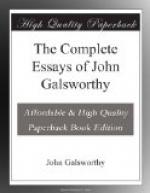uphold the Censorship of Plays would be the first to
resent. It is true that Societies of artists
and the proprietors of Galleries are subject to the
prosecution of the Law if they offend against the ordinary
standards of public decency; but precisely the same
liability attaches to theatrical managers and proprietors
of Theatres, in whose case it has been found necessary
and beneficial to add the Censorship. And in
this connection let it once more be noted how much
more easily the ordinary standards of public decency
can be assessed by a single person responsible to
no one, than by the clumsy (if more open) process of
public protest. What, then, in the light of the
proved justice and efficiency of the Censorship of
Drama, is the reason for the absence of the Censorship
of Art? The more closely the matter is regarded,
the more plain it is, that there is none! At
any moment we may have to look upon some painting,
or contemplate some statue, as tragic, heart-rending,
and dubiously delicate in theme as that censured play
“The Cenci,” by one Shelley; as dangerous
to prejudice, and suggestive of new thought as the
censured “Ghosts,” by one Ibsen.
Let us protest against this peril suspended over our
heads, and demand the immediate appointment of a single
person not selected for any pretentiously artistic
feelings, but endowed with summary powers of prohibiting
the exhibition, in public galleries or places, of
such works as he shall deem, in his uncontrolled discretion,
unsuited to average intelligence or sensibility.
Let us demand it in the interest, not only of the
young person, but of those whole sections of the community
which cannot be expected to take an interest in Art,
and to whom the purpose, speculations, and achievements
of great artists, working not only for to-day but for
to-morrow, must naturally be dark riddles. Let
us even require that this official should be empowered
to order the destruction of the works which he has
deemed unsuited to average intelligence and sensibility,
lest their creators should, by private sale, make
a profit out of them, such as, in the nature of the
case, Dramatic Authors are debarred from making out
of plays which, having been censured, cannot be played
for money. Let us ask this with confidence;
for it is not compatible with common justice that
there should be any favouring of Painter over Playwright.
They are both artists—let them both be
measured by the same last!
But let us now consider the case of Science. It will not, indeed cannot, be contended that the investigations of scientific men, whether committed to writing or to speech, are always suited to the taste and capacities of our general public. There was, for example, the well-known doctrine of Evolution, the teachings of Charles Darwin and Alfred Russet Wallace, who gathered up certain facts, hitherto but vaguely known, into presentments, irreverent and startling, which, at the time, profoundly disturbed every normal




